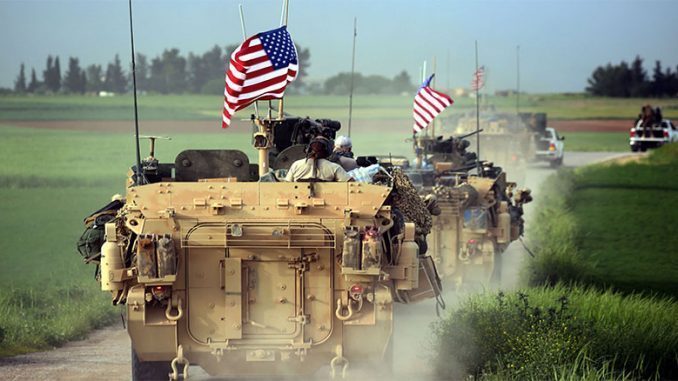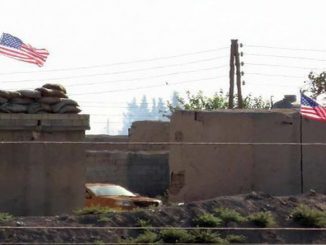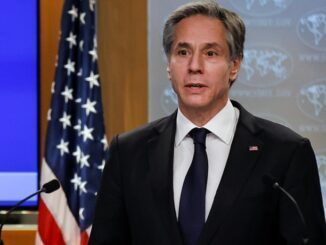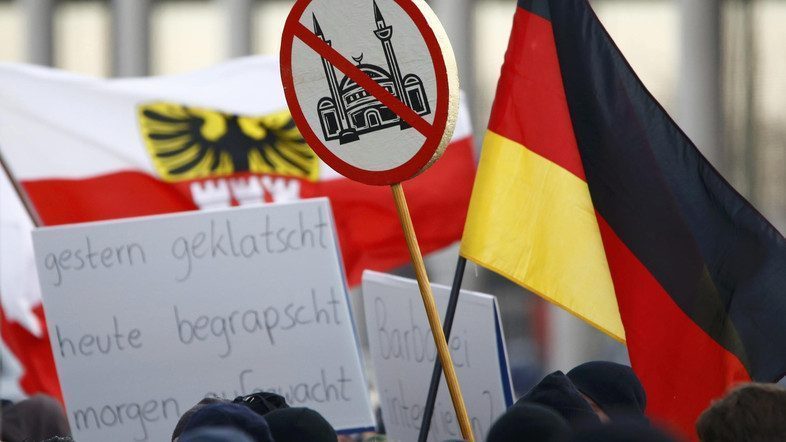
 BY: Mohamed Abu Saada*
BY: Mohamed Abu Saada*
Introduction
U.S. Secretary of State Rex Tillerson met with Turkish President Recep Tayyip Erdogan in Ankara on Thursday, February 15, 2018 in attempt to calm the tense relations between the two countries in light of the Turkish military operation in Afrin, Syria (Operation Olive Branch) against US-backed Kurdish militias. Tension between the two countries has taken several forms, including diplomatic, political and media, especially after Turkey asked the United States to withdraw its troops from the Syrian city of Manbij as it would be the next target for the Turkish forces after liberation of Afrin. This was announced in a statement by Turkish President Erdogan, who said that the Turkish forces would go to Manbij and continue up to the border with Iraq. However, Trump Administration’s response to Erdogan’s statement was that the Afrin operation should be limited and not prolonged. The U.S. administration also that the US troops do not intend to withdraw from Manbij. In fact,, the U.S.-Turkish differences on this issue came to the surface in light of a clear state of lack of trust, and amid accumulation of crises between the two countries. Turkey believes that the US diplomatic language – in attempt to mend its historical ties with Ankara and at the same maintain relations with its new Kurdish ally through playing a game of balance – is merely a diplomatic tactic to evade Turkish demands, and that Ankara will no longer be fooled by such a policy.
First: Causes of US-Turkish differences
1- Bilateral differences
U.S.-Turkish relations were damaged after the failed coup of 2016 with Turkey stung by a perceived lack of U.S. solidarity and angered by Washington’s refusal to extradite Fethullah Gulen, a Pennsylvania-based cleric accused of orchestrating the putsch.
Tension in the two countries’ diplomatic relations later intensified due to:
– The U.S. delay in appointing a new ambassador to Turkey to succeed Ambassador John Pass,
– The visa suspension crisis between the two countries,
– The conviction of a Turkish banker, Mehmet Hakan Atilla, by a U.S. court for alleged participation in violating American sanctions against Iran,
– Sentencing NASA scientist Serkan Golge, a dual national, to seven-and-a-half years for being a member of Gulen’s movement.
– Detention of U.S. pastor Andrew Brunson, who ran a church in Izmir, on similar charges since October 2016.
The U.S.-Turkish tension has also stirred up Turkish public opinion, with 83 percent of Turks expressing dissatisfaction with the United States’ position on Turkey, according to a poll conducted recently by the American Progress Center.
2- U.S. Position on Kurdish Factions in Syria
The Turkish intelligence has reported that more than four thousand trucks of US weapons were delivered to the Kurdish militias, in coincidence with the announcement by Washington of its intention to build an army of 30 thousand soldiers from its Kurdish allies to protect the border area with Turkey (along 600 kilometers of Syrian-Turkish border). In fact, this was an almost literal implementation of General David Petraeus’ plan that requires: separation of “groups that may be part of the solution” from al-Qaeda, and placing them in the face of the Islamic State and the regime of Bashar al-Assad. The plan also involves sending a large number of U.S. troops to join local allies for the liberation of territories that are under the control of extremist forces. In this way, the U.S. military would maintain existence on the ground (either directly or indirectly) in a country that has been monopolized by Russia for decades.
3- Strategic differences
Some point out that there are several strategic objectives for the United States in the region that are not in favour of the Turkish interests, which can be summed up in:
(A) The U.S. wants to establish a military base in a strategic area on the Asian-European border, and avoid reliance on Turkey, its strategic ally, after Turkey in 2003 rejected a U.S. request to allow its forces to launch attacks on Iraq from Turkish territory.
(B) Turkey believes that its strategy on the Middle East, Iran and Russia contradicts the United States’ priorities; and accuses Washington of abandoning the fundamentals of the historical relationship between the two countries. Therefore, Ankara believes that it is Turkey’s duty not to compromise on its national security issues.
Second: Future of U.S.-Turkey Relations
Scenario I: Stalemate in U.S.-Turkish Relations
The U.S.-Turkish relations seem to be entering a stalemate, which usually precedes a complete rupture of relations. This stage may come after a likely direct military clash between the forces of the two countries in Manbij. Turkish Foreign Minister Mevlut Cavusoglu has recently warned of this, saying that “The relations between Turkey and the United States have deteriorated to a point of either being fixed or breaking down completely”.
Scenario II: Improvement of US-Turkish Relations
This could be achieved through finding a way out of the crisis of the role of both countries in Syria in a way that should satisfy the two parties, especially regarding the city of Manbij, already controlled by the US-backed Kurdish PYD/YPG forces, which have been classified as terrorist organizations in Turkey. In addition, the United States has up to 2,000 troops stationed in Manbij, which raises fears of a likely confrontation between the two NATO allies. After a spike in tensions between the two countries over Syria, U.S. Secretary of State Rex Tillerson on mid-February said Turkey and the United States would work together in Syria. “We are not going to act alone any longer, not U.S. doing one thing, Turkey doing another,” Tillerson said in Ankara after talks with Turkish counterpart Mevlut Cavusoglu. “We will work together… we have good mechanisms on how we can achieve this, there is a lot of work to be done,” he said. For his part, Turkish Foreign Minister Mevlut Cavusoglu said Turkey and the U.S. agreed on the need to normalise relations. He said ties were at a “critical phase” and vowed to create “mechanisms” to discuss issues that were causing problems. Cavusoglu also said the YPG must leave Manbij. “We must be sure that YPG has gone east of the Euphrates,” the Turkish minister said.
Scenario III: Unstable Relationship
There is a possibility for maintaining the war of words between Washington and Ankara with likely further political and media escalation. Although Ankara’s interests intersect at many points with the U.S. strategy in Syria, the Turkish sensitivity towards the Kurdish issue makes it a priority to the country’s foreign policy. Ankara is expected to maintain diplomatic pressures on Washington, and perhaps will move in the near future to a kind of military escalation regarding Manbij in order to prompt U.S. to remove the Kurdish militias from the city and hand over Manbij to the Turkish Euphrates Shield troops. However, U.S. Secretary of State Rex Tillerson’s proposal to build a 30-kilometer-deep safe zone in northern Syria, which had been a Turkish, was also on the table during Tillerson’s tour in the region, which could achieve strategic benefits for Turkey’s national security and refugees.
Finally
We can conclude that the third scenario is closest to reality, due to the Turkish strategic decision on the issue of Manbij, which will be a real test to the Turkish-US relationship in the next stage. Although the U.S. administration does not want to engage in war or any kind of direct confrontation with Turkey in Syria or abroad, it tries to address differences between the two countries without abandoning its Syrian Kurdish ally. Therefore, it is expected that the United States will follow a strategy based on avoiding clashing with Turkey through activation of diplomatic activity on the political level. However, Washington is expected to leave U.S. military command there to decide what could be done on the ground.
*Mohamed Abu Saada, a Palestinian researcher, is to get a doctorate in political science from Turkish Sakarya University. He got his Master degree in Political Science on “Iran’s policy towards the Islamic resistance movements in Palestine”. The article was published in the Egyptian Institute for Studies (EIS).



